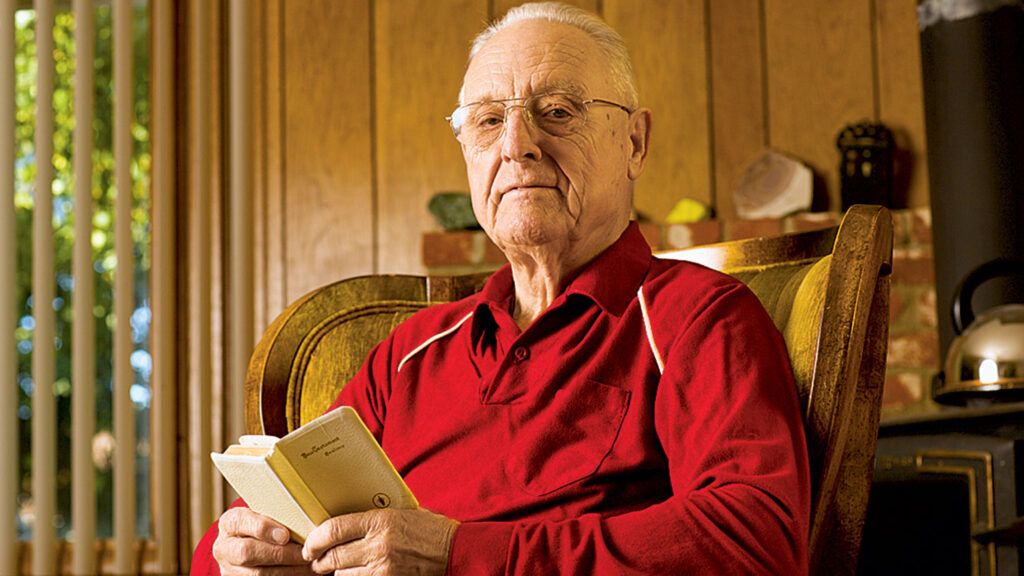This story first appeared in the January 2008 issue of Guideposts magazine…
I have a small leather Bible I keep in a drawer by my bed. I don’t read it much—I have a bigger Bible for my devotions. But I pull it out any time I tell my story to a church group. I hold it in the palm of my hand—it’s just that big—and explain that, if it weren’t for that Bible, I wouldn’t be in church. Wouldn’t be talking to them. Probably wouldn’t be alive.
I tell them that Bible, with its scuffed white cover and its aged pages, means more to me than any other book. It saved my life. I got it on October 25, 1941, the day a chaplain on the USS Maryland walked around the ship handing out small, white Bibles. I didn’t think much of it.
I opened it absent-mindedly and read an inscription on the flyleaf: The White House. January 25, 1941. To the Armed Forces: As Commander-in-Chief I take pleasure in commending the reading of the Bible to all who serve in the armed forces of the United States.
Throughout the centuries men of many faiths and diverse origins have found in the Sacred Book words of wisdom, counsel and inspiration. It is a fountain of strength, and now, as always, an aid in attaining the highest aspirations of the human soul. Very sincerely yours, Franklin D. Roosevelt.
READ MORE: FINDING FORGIVENESS AFTER PEARL HARBOR
Huh, I thought, and tossed the book in the bottom of my seabag. I certainly had no interest in reading about the highest aspirations of the human soul. I was having a grand time onboard the Maryland. My high school buddy Dale Bicknell and I had enlisted in the Navy together the year before, mostly because it was the Depression and there were no jobs in our small town in Washington state.
I was 19. We’d both trained as radiomen, and Dale had been assigned to the USS Arizona, which, like the Maryland, was a U.S. Pacific Fleet battleship. That meant we were both on two of the biggest, safest ships in the fleet—far from the war raging in Europe. America was providing support to its allies, but not fighting. That was fine by me. I had a young wife, Julia, back home. We’d met just before I enlisted.
I liked being a radioman because the radio room was on the second deck just above the water line. And the emergency radio room was one deck below that. Very safe. When nothing was happening I liked to slip into the emergency radio room to catch up on sleep.
That’s what I did early on the morning of December 7, when the Maryland, along with most other ships in the fleet, was docked at Pearl Harbor in Hawaii—right next to the Oklahoma, two ships back from Dale on the Arizona. I stretched out on the steel floor, put a lifejacket under my head and drifted off, thinking of Julia.
Julia was a Christian—she was very up front with me about her faith when we married. I didn’t hold much with religion. Didn’t object to it, but I wasn’t about to make it my be-all. I preferred my own luck. It had worked out pretty well so far.
Frantic knocking jolted me awake. The radio room’s steel door clanged—I’d locked it, thinking no one would ever need to get in. I unsecured the hatch. Men poured in, faces panicked. “We’re being attacked!” they shouted. The room became confusion. Radios flipped on, signals came in. “Enemy fighters! Filling the sky!” “Bombs! Guns!” The ship rumbled. Explosions sounded dully above.
“The planes are Germans! No, wait, cancel that, Japanese! They’re Japanese!” Our guns opened up and the bulkheads vibrated. I was drenched in sweat, grabbing a receiver, relaying orders. Suddenly the roaring stopped. “There’s a lull,” came a report. “Put on gas masks. The next round could be a gas attack.”
SHOP OUR SELECTION OF BIBLES AND BIBLE REFERENCE BOOKS
We had no gas masks in the radio room. “I’ll get them,” I said, and raced up the ladder to a supply room. I passed a porthole and looked out. Black smoke billowed across the harbor, pouring from ships, obscuring—wait. I shouldn’t be able to see this. The Oklahoma—where is it? I looked down. It was sunk.
The attack lasted 90 minutes. When the all-clear sounded, the men onboard the Maryland, just over 1,000, made their way topside. Smoke was so thick, it was hard to see. To one side, rescue boats fished bodies from the water. On the other side, strange thumping sounded. I looked over. The Oklahoma was bottom side up—and men were pounding inside the hull for rescue.
I ran forward, looking frantically for the Arizona. I saw the tip of its mast poking from the water, broken. The rest was smoke. Dale. I leaned against the railing, sick. Dale was dead. His death made me feel shattered, vulnerable.
The Maryland was among the least damaged in the fleet, and we soon sailed to the mainland for repairs. I was transferred to the USS Columbia, a light cruiser, not quite as big as a battleship. We steamed into the South Pacific and took up position off Guadalcanal, where we bombed enemy positions during the months-long campaign to secure islands for allied forces.
I kept myself numb, doing my duties, writing to Julia, trying not to think about Dale. Or about death.
One day in 1943 our captain told us the ship was going to a dry dock for repairs. We pulled alongside a floating dry-dock boat in the middle of the ocean. We sailed over the dock and they pumped their tanks out, lifting the Columbia from the water. Repairmen swarmed the hull, cleaning and brushing it with a special coating that made the ship faster.
“Men,” said the captain, “we’re being retrofitted for a very dangerous mission. Marines are preparing to storm a strategic island near here. Before they do, we’ll sail alone, under radio silence at night, into a harbor on the other side of the island to create a diversion by bombing a Japanese fortress. I anticipate the Japanese will unleash the full power of their guns and torpedoes on us. I must be honest. Our chances of survival are not high.”
Murmurs filled the ship as men took this in. I thought instantly of Julia. I’d never get to say goodbye! I made my way to my bunk, hoping no one would see the fear tightening my face. I sat on the mattress and put my head in my hands. No way to sugarcoat it. The captain had basically said, “You will die tonight.” Was I ready for that? I looked frantically around the empty room.
My eyes fell on my locker. Wait a minute. Wisdom, counsel, inspiration.… I yanked the locker door open and fished through my clothes, shaving gear, shoes. Yes! There it was, buried under everything else, the tiny white FDR Bible. I pulled it out and cradled it in my hand.
I’ve been ignoring you. What can you tell me now? I opened it. Some weird passage about a guy and a whale. No, not that. I flipped again. Psalm 91. “I will say of the Lord, he is my refuge and my fortress.… A thousand shall fall at thy side, and ten thousand at thy right hand, but it shall not come nigh thee.” It shall not come nigh thee. Was that serious? Was that meant for me? I felt my heart break down.
God, I hope this isn’t too late, but if you really mean that, then I promise I will serve you the rest of my life. Please be near me now. I opened my eyes and looked at the Bible. Indescribable peace flooded over me. Then I went back to my station in the radio room.
READ MORE: AFTER PEARL HARBOR, CHRISTMAS ANGELS APPEAR
The night was dark and hot. We sat miserably in the radio room, waiting for the guns to light up. The engines hummed steadily. Suddenly the bulkheads shook as our guns unleashed. Signals poured in and my fear evaporated in the chaos. The ship lurched to evade torpedoes. A shout came over the line. “Torpedo, straight ahead! We can’t dodge this one! Brace yourselves!”
I gripped the receiver until my knuckles whitened. It shall not come nigh thee, it shall not come nigh thee. We counted the seconds. One. Two. Three. Ten. Twenty. I let out a breath. Where was the torpedo?
A call came. “Stand down, men. We’re not sure what happened, but that torpedo went right under us. It’s behind us now.” The room erupted in whooping, then we were back at our jobs. I heard the ship’s engines throttle to full speed. “We’re getting out of this harbor, men. Mission accomplished!”
Not long after that night, the Columbia was sent home for repairs and rest. I served most of the rest of the war overseeing radio communications at a Naval air station in North Carolina, where Julia joined me. True to my promise, I became a faithful churchgoer and began volunteering my engineering skills at a church-radio network.
I traveled all over the world, servicing radio stations and telling my story to whomever would listen. Not to fulfill an obligation, but because I wanted—needed—to share the joy that I’d found.
In a sense, you could say, I’ve never left the side of that tiny white Bible, which sits in my drawer. It saved me from more than an enemy torpedo, gave me a new definition of life—one beyond my own luck or understanding. It is indeed the highest aspiration of the soul—this tiny book, filled with life everlasting.
For more inspiring stories, subscribe to Guideposts magazine.







